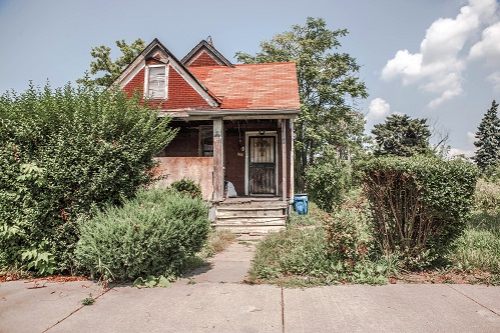- How to calculate the value of your home for insurance
- Appraised value
- Assessed value
- Fair market value
- Replacement value
- Actual cash value
- Is homeowners insurance based on property value?
- Which valuations are used for home insurance?
- How do insurance companies determine dwelling value?
- Frequently asked questions
How to calculate the value of your home for insurance
There are five types of home valuations. Below, we'll cover what organizations perform them, what they are used for, and when you might need them.
Appraised value
Who usually performs it: An independent appraiser
When it’s used: Buying a home, getting a mortgage or a home equity line of credit
About appraised value: Mortgage lenders choose a professional appraiser to evaluate a property's value. The borrower typically pays for the appraisal.
Mortgage lenders use the appraisal to determine how much they are willing to lend a buyer for the property.
The appraised value is used both for new mortgages as well as other types of borrowing in which you may put the house down as collateral. A lender will use the appraisal to figure out the loan-to-value (LTV) ratio.
The LTV is typically kept below 80%. That means you are being loaned 80% or less of the home’s appraised value. A higher LTV may prevent borrowing or require the person to get mortgage insurance.
A low appraised value can also affect whether a homebuyer can take out a mortgage. In fact, you may find the appraised value of a home is much different from its market value. That difference can affect whether you get a mortgage.
Let's say you agreed to pay $400,000 for a home, but the appraisal says it's only worth $300,000. The lender may not grant a mortgage in that case unless you are able to provide enough of a down payment to reduce the loan-to-value ratio.
Assessed value
Who usually performs it: Local or county government, such as an assessor or tax collector
When it’s used: To calculate property taxes
About assessed value: Governments use assessed value to figure out what to charge you for property taxes. This is usually lower than the appraised value and market value. In other words, don't fret if you paid $500,000 for a home and the assessed value comes back $350,000. Look on the bright side -- a lower assessed value means you pay less in taxes than what your home is worth on the market.
The appraised value analyzes nearby home sales and values, improvements and new additions to your home, as well as its current condition.
The government will create an assessed value and then calculate your property taxes based on the community or county's property tax rate. Assessed value is especially important in states with no sales or income tax. These states can have higher property taxes than a similar state with an income or sales tax.
Fair market value
Who usually performs it: Licensed appraiser
When it’s used: Home insurance claims, home mortgage refinancing, eminent domain proceedings, short sale
About fair market value: Fair market value is what a property is worth on the market. In other words, what you could get if you sold the home right now.
Fair market value can increase or decrease after the purchase. For instance, maybe your community built a new high school. That likely increased your taxes, but it also probably increased the fair market value of your home. New schools bring new families, which can heat up a local housing market.
Fair market value calculations consider what similar nearby homes are currently selling for, and the state of the home and property as well as factors about the community.
Replacement value
Who usually performs it: Insurance company
When it's used: To calculate dwelling coverage on your home insurance
About replacement value: The replacement value is what it would cost to replace your home if it's destroyed. Home insurance policies with replacement value usually cost more than actual cash value. That's because the insurer is agreeing to pay the current amount to rebuild your home if you file a claim, which is likely higher than when it was originally built. Depreciation is not taken into account.
Figuring out the replacement value of your home can be challenging, but it's integral to your policy as it's tied to your dwelling coverage amount, and not having an accurate number can leave you underinsured. Read our guide on how to calculate the replacement value of your house for more details.
Actual cash value
Who usually performs it: Insurance company
When it's used: To calculate the depreciated value for a claim
About actual cash value: The actual cash value is the current value of your home allowing for depreciation.
An actual cash value policy is usually cheaper than replacement cost since the insurer is only agreeing to reimburse you for the depreciated value of the home and not what it would cost to replace it.
Depreciation considers the age of the home and the expected lifespan of the home. Actual cash value is calculated by taking the current replacement cost and subtracting depreciation to determine how much the insurance company would pay.
Actual cash value is unusual for a home insurance policy, but is used in some cases, usually with homes that are older or don’t need replacement cost eligibility requirements.
Is homeowners insurance based on property value?
No, except in the sense that the home itself is property with a value. The term "property value" usually refers to the value of the entire property, including the land. Land value, however, has nothing to do with homeowners insurance.
Home value for insurance purposes is based on the value of the home itself if it had to be rebuilt, known as the replacement cost. Property value is usually more closely associated with market value and real estate than with insurance.
Which valuations are used for home insurance?
As you can see, home valuations can fluctuate depending on the situation. You'll likely come across different types of home valuations when you buy a home, refinance a mortgage or apply for a home equity line of credit.
However, for insurance purposes, replacement cost or actual cash value are the two types of home value calculations that are used.
How do insurance companies determine dwelling value?
Dwelling value is the replacement cost of your home and is calculated based on:
- Construction type
- Age of home
- Square footage
- Materials used inside and outside of the home
- Features like fireplaces, porches or skylights
Frequently asked questions
Is homeowners insurance based on appraised value?
Homeowners insurance isn't generally based on the appraised value of your home. It's usually based on the cost to rebuild your home if it's damaged or destroyed, along with other factors like location and coverage options you choose.
Read more on how is homeowners insurance calculated
Does home insurance increase with home value?
Not always. If your home's value went up because you made improvements to the home, than your insurance will go up to protect those improvements. However, if property values in your area are simply rising due to market conditions, your home insurance isn't affected.





